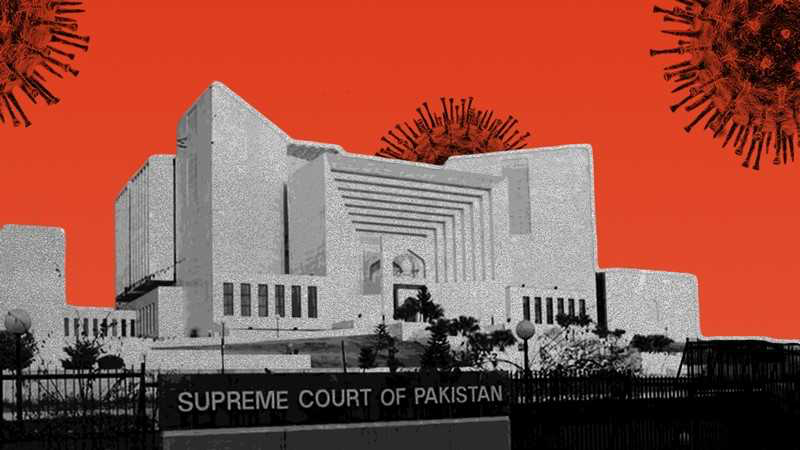The Supreme Court has expressed its distrust in the ration and funds distribution in the country and asked for more details while hearing a suo moto case on the coronavirus pandemic.
The court has asked all the four provinces and Gilgit-Baltistan to submit reports on the matter to show the transparency of the distribution process and asked for details of the Zakat fund.
A five-member bench, headed by Chief Justice Gulzar Ahmed, heard the case on Monday.
The court asked where the federal government’s reply in the case was, to which the attorney-general said that the health ministry and NDMA have submitted two replies.
The top judge said that the Zakat department in its reply has shared details on the law but not given any other details. The reply just says that the Centre has collected Rs9 billion as Zakat, remarked Justice Umar Ata Bandial. There is no mention of how the funds will be given to the people.
The attorney-general said that the federal government allocates funds to all the provinces and then the provincial governments distribute the money to needy people. A big part of the fund is spent on the administration of the distribution process.
The chief justice remarked that the Zakat fund shouldn’t be utilised to pay for foreign visits of officials. Many government officers are paid salaries from the fund. “What’s the point if this is how you want to spend the fund?”
We still don’t know where the Auqaf department and Baitul Mal spends its money, the chief justice said.
The court has summoned the Shariah advice of Mufti Taqi Usmani to know whether the funds of Baitul Mal and Zakat can be spent on administrative work.
Health Secretary Tanveer Qureshi also appeared in court. He told the court that they have turned five hotels into quarantine centres in Islamabad without any force, adding that the city’s Haji camp and Pakistan-China centre are providing free of cost quarantine services.
Justice Ahmed said that the authorities should ensure that all facilities are available at quarantine centres. The quarantine centre in Taftan was no less than a nightmare, he said, adding that the government has been spending a lot of funds, but we can’t see where they are being spent.
Sindh Advocate-General Salman Talibuddin told the court that Rs569 million have been distributed to over 94,000 people from the Zakat fund.
Justice Sajjad Ali Shah asked who has received the money, to which the advocate-general said that they are the same people who receive Zakat funds every year.
How is it possible that the Sindh government distributed ration worth Rs1 billion and no one found out, asked Justice Ahmed. Sindh officials love to boast even if they do one good deed, he said.
The advocate-general said that the ration bags were distributed from 4am to 7pm in different parts of the province. The process started on March 30 and it is still continuing. One bag has rations for 10 days at least, he added.
‘No shortage of masks in Pakistan’
There is no shortage of masks in Pakistan, said the National Institute of Health in a report submitted to the court.
“There were baseless and unfounded allegations that 20 million masks have been allowed to be smuggled out of country resulting in their shortage in the country,” it read. It said that NOCs for the export of 3.5 million masks were issued to five Chinese companies on the request of the Chinese embassy and the matter is being investigated by the FIA.
The report said that the government is going to provide a special package to the families of doctors and paramedics who have died in the fight against COVID-10. They will get additional salary till the virus comes to an end and their families will also receive a special package for their courage and bravery.
According to the report, the NIH started testing for COVID-19 on February 1 and since then it has been providing free of charge testing facilities to people in Islamabad, Rawalpindi, Azad Jammu and Kashmir, Gilgit-Baltistan, northern Punjab and some districts of Khyber Pakhtunkhwa.

